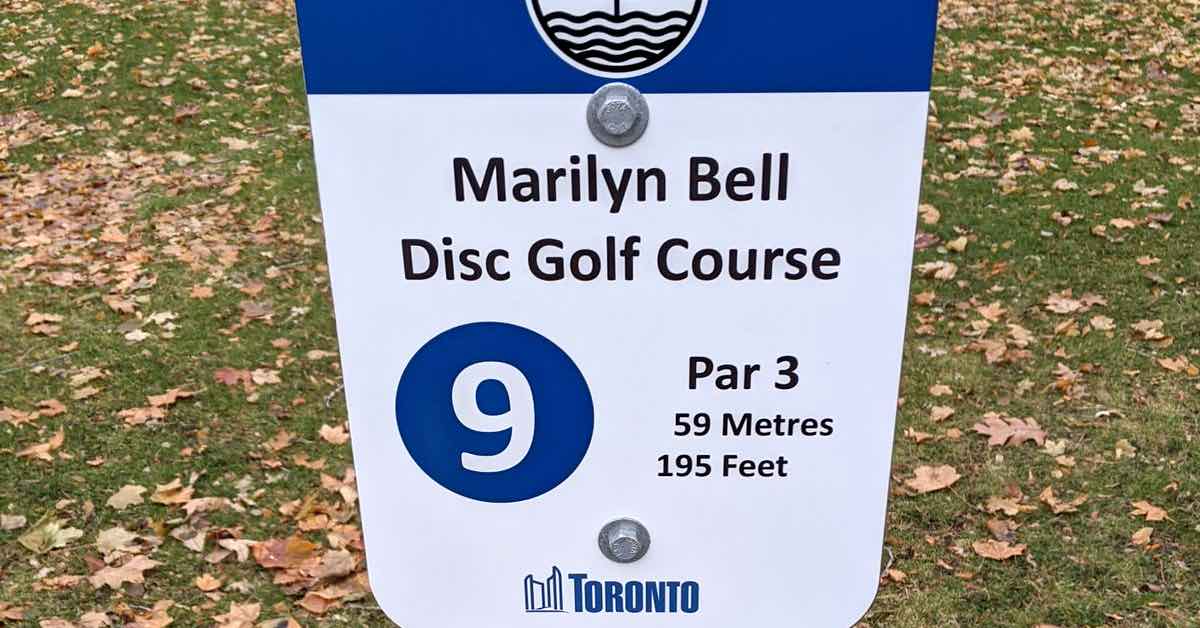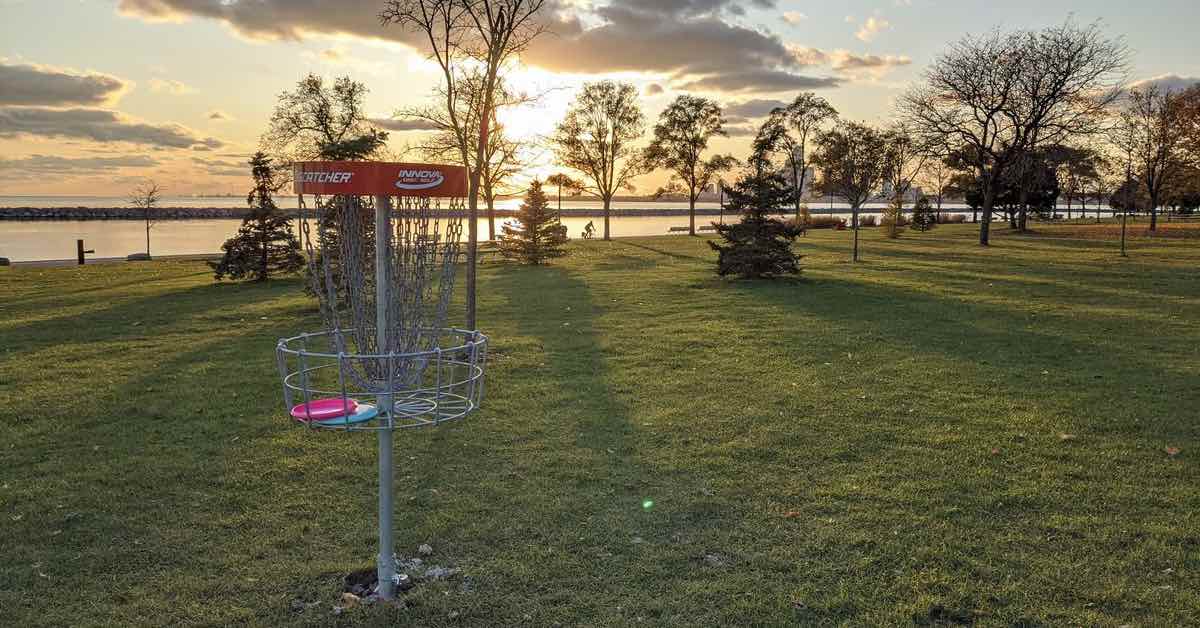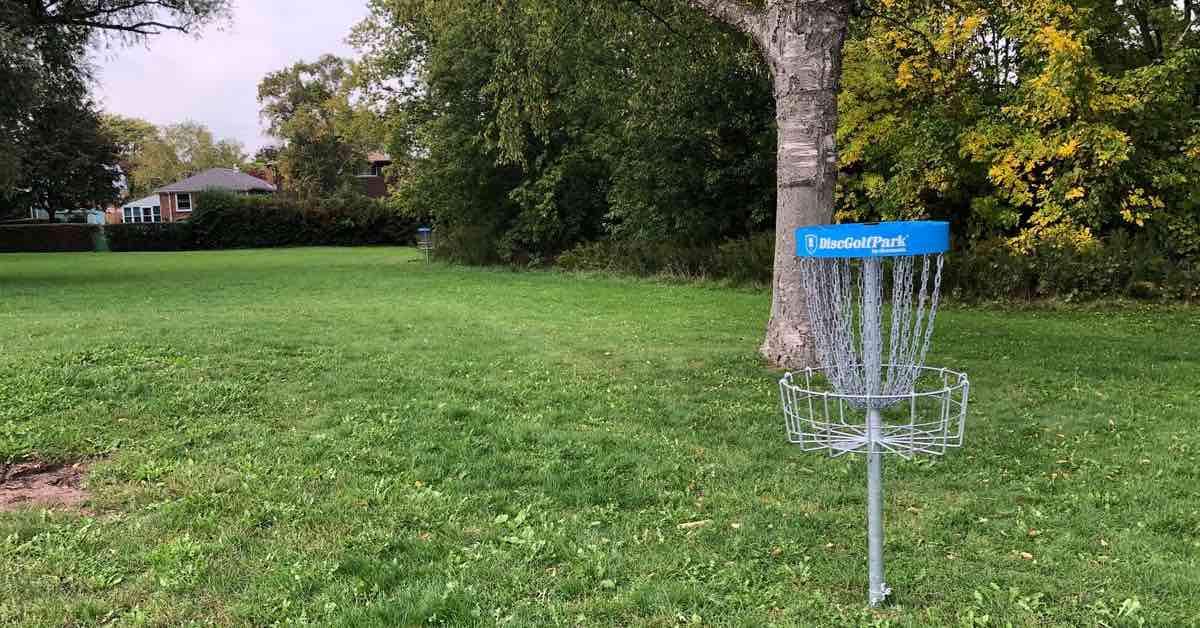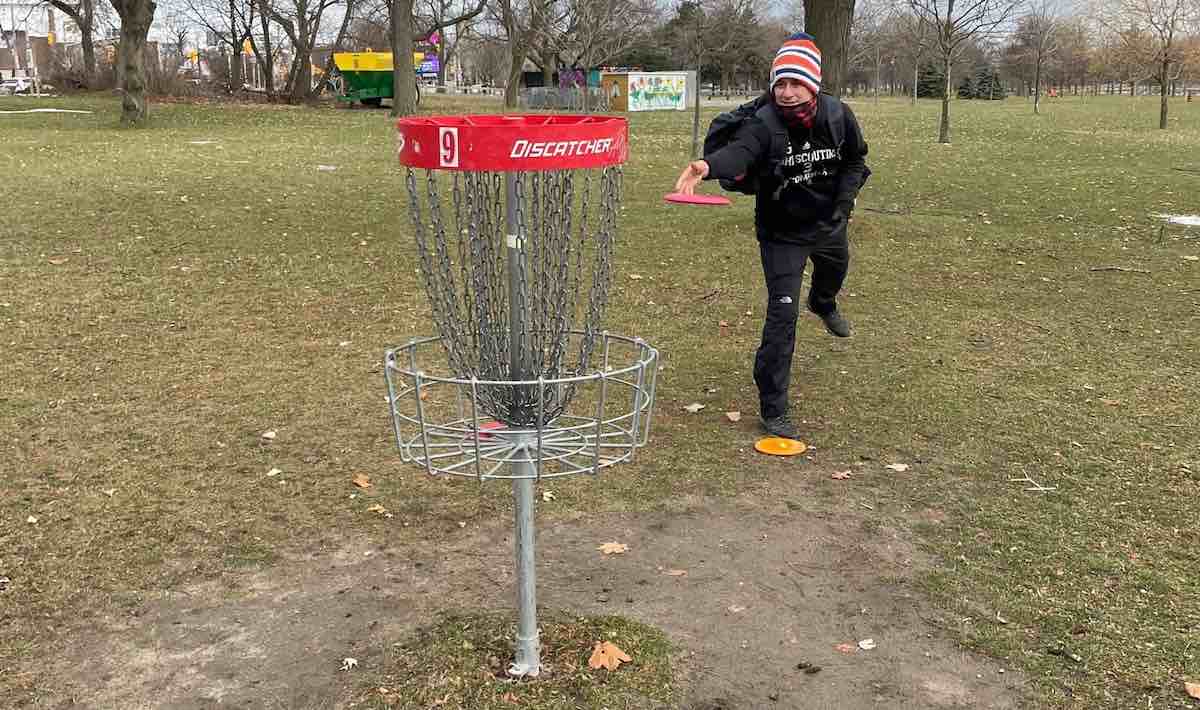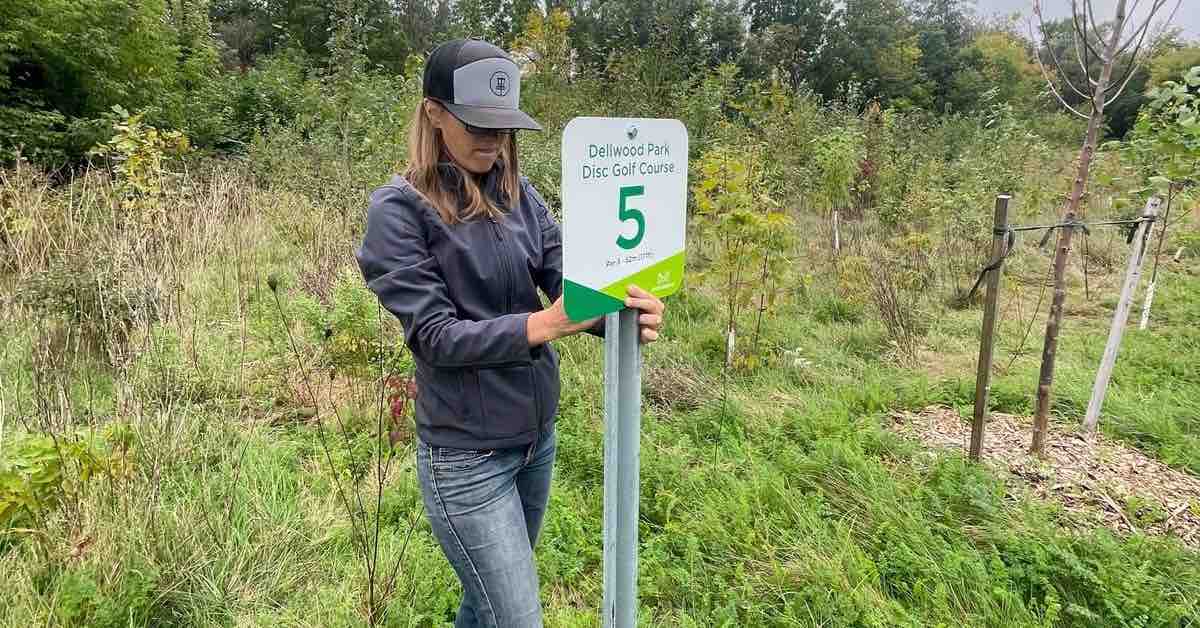Why does disc golf need ‘pitch & putts,’ anyway?
By Alex Williamson
When most experienced disc golfers dream of adding a new course to their community, they envision something epic. Maybe long fairways winding through tight woods or a championship layout on the manicured landscape of their local country club’s traditional golf course. What few longtime players think of as the ideal addition to their community is a simple, short course playing through a cozy neighborhood park.
Photo uploaded to UDisc Courses by ztepils.
While we love stunning, challenging disc golf courses here at UDisc, we also know that easier, beginner-friendly courses – the sometimes maligned “pitch and putts” – are the lifeblood of the sport. They’re rarely the disc golf courses serious disc throwers fantasize about, but they deserve players’ full support because, without them, the demand for disc golf would plummet.
To learn about the essential role easy courses play in a thriving disc golf ecosystem, we talked with players in Toronto, Canada, which has the most active disc golf scene within any of North America’s five largest cities by population.
How Does Toronto Show the Value of Easy Disc Golf Courses?
North America’s most-populous cities are, respectively, Mexico City, New York, Los Angeles, Toronto, and Chicago. Of those, just L.A. and Toronto have permanent disc golf courses within city limits. Amazingly, Toronto outdid L.A. in rounds recorded with UDisc by nearly 5,000 in 2023 despite L.A.’s advantages of year-round prime disc golf weather and nearly 1 million more people.
Toronto has seven disc golf courses in city limits, and two of them – Marilyn Bell and Beaches Disc Golf Course – only offer layouts classified as “easy” per our disc golf course difficulty rating system. Those two courses accounted for nearly a third of Toronto’s 2023 UDisc round total (about 9,500 out of around 32,000 rounds). Keep in mind that while UDisc is the #1 disc golf app and rounds recorded with it are the best metric the sport has to judge courses’ popularity, not every round of disc golf – especially at courses frequented by beginners who are less likely to worry about score – is scored with the app. It’s almost certain that these easy courses see many thousands of plays per year more than what’s recorded with UDisc.
A basket at Marilyn Bell Disc Golf Course in Toronto, Canada. Photo uploaded to UDisc Courses by devendra70.
Along with the stats, the experiences of people deeply involved with nurturing Toronto disc golf demonstrate how important its beginner-friendly courses are. Cara Hovius of ChainLink Disc Golf, an organization that has spearheaded various disc golf projects in and around Toronto in recent years, told us that these courses stir up new interest in disc golf and make people eager to play again once they try it.
“The largest segment of players in the Toronto area are, and always will be, recreational players,” Hovius said. “Sometimes it takes seeing the sport a few times before someone will give it a try and, being located within established neighborhoods, these courses allow for that.”
Ridiculously active Toronto disc golfer and glow league organizer Andrew Kavanagh also attested to the power of Toronto’s easiest courses to attract new disc golfers.
“I’ve come across countless individuals and groups who are playing their first ever round of disc golf at Marilyn Bell Park,” said Kavanagh, who has personally logged over 1,400 rounds at that course in recent years. “It’s amazing to see their joy and excitement in chasing their first pars after playing for a short time.”
When we zoom in on Toronto, we zoom in on a disc golf community that is thriving, in part, due to its important stakeholders understanding the worth of easy courses. The city’s multiple and popular beginner-friendly tracks are thoughtfully-designed and well-maintained – attracting new players from various walks of life while continuing to entertain experienced ones.
Easy Disc Golf Course Advantages: Family Bonding & Great for Sharing
Sean and Teddy Lamb are, respectively, a father and son (age 12) who play at least once a week at Beaches. The average length of the course’s nine holes is 195 feet/59 meters.
Teddy’s father Sean discovered the sport when a neighbor started up a glow disc golfleague, convinced Sean to give it a try, and he got hooked. After a few weeks of playing with other adults, Sean asked his son – around 10 at the time – if he wanted to come with him for a round. Two years later almost everything on Teddy’s birthday and Christmas wishlists is related to disc golf.
Though Toronto and the surrounding area have an abundance of disc golf courses, Sean said he and Teddy opt for Beaches “99% of the time” in part because its short holes and lack of serious rough let them “rip around the course in 25 minutes.” The two are also still seeking their first disc golf aces (AKA, hole-in-ones), and their chances to get one are higher at Beaches than almost anywhere else in town.
“I love playing Beaches because it’s nice and short,” Teddy told us. “You are able to get your disc close on your tee shot on almost every hole. It’s really fun when I park it for a birdie.”
Teddy Lamb (right) and his sister Simone out for a round of disc golf in Toronto. Photo courtesy of Sean Lamb.
The duo make outings to longer, harder courses on occasion and have fun, but if playing those courses was their only option, the sport would be a much smaller part of their lives.
“It’s just not quite as enjoyable for our skill level,” Sean explained.
Sean is thrilled with the bonding experience disc golf offers him and his son as its something they talk about constantly off-the-course, too. Wanting to spread their joy, they regularly introduce others to their favorite hobby.
“It’s a great course to bring friends to that have never played disc golf before,” Teddy said. “Even if they haven’t played before, they can come out and still have fun on the course.”
Such sharing, though, hinges on Beaches’ accessibility.
“I would never take anyone new to the sport, let alone a 12-year-old, to a longer course,” Sean said. “It would just be frustrating for them and not a good experience.”
Easy Disc Golf Course Advantages: Enjoyment for All Experience Levels & Ages
Around a 25-minute drive from the heart of Toronto in Mississauga is the easy, six-hole Dellwood Park Disc Golf Course. It’s frequented by Philip van Wassenaer, a disc golfer nearing 60 who first played an obstacle disc golf course of his own devising when he was a teenager and never lost his spark for the game. For most of his life, he played disc golf most often when traveling for work since his own hometown didn’t have a course.
When he learned that ChainLink Disc Golf had advocated and received permission to build a course in the park just outside the house he rents for an office space, he was thrilled.
“It’s ten steps from the back corner of the yard to hole 1,” van Wassenaer said.
A basket at Mississauga’s Dellwood Park Disc Golf Course just outside of Toronto. Photo uploaded to UDisc Courses by jboehmer.
He described Dellwood as a “pocket park” in the middle of a residential area that draws a wide demographic. There are enthusiastic “beginner types” who play multiple rounds on the nearby four-hole Spruce Park Disc Golf Course and complete their day with another few at Dellwood Park. Teachers from a school close to the park bring their classes. And he sees ever more people at Dellwood enjoying their first rounds.
“There’s been quite an increase in people who clearly are coming there with no previous disc golf experience – new and novice players, boyfriends and girlfriends,” van Wassenaer said.
As an experienced disc golfer, he thinks Dellwood is a “fantastic” place to hone his upshot and putting skills during rounds he can complete in as little as 15 minutes. He said his friends and peers like the course because it’s not too taxing.
“I should also add that, getting closer to 60, my weekend pals are all that age or older, and they rather like coming to play because the course just doesn’t stress you out as much physically with the shorter holes,” van Wassenaer said.
Easy Disc Golf Course Advantages: Keeping Experienced Players Engaged
While attracting new players to disc golf is important, we shouldn’t forget that even people who’ve been playing for years can lose interest if their situation changes. If a community only offers up courses that require sizable time commitments, life events like having kids or switching jobs could mean that disc golf no longer fits in the schedule. When there are well-designed short courses available that can be finished in well under an hour, more people can squeeze a few rounds into their weekly routines.
Almost everyone we talked to in the Toronto disc golf community mentioned how the city’s fun, easy courses allow them to play more disc golf than they would otherwise.
One example is Lauren Ho, who’s in the Toronto Women’s Disc Golf Club and organizes a winter putting league.
“While I enjoy playing courses that are more difficult in terms of distance and technicality, it’s nice to balance it out with shorter ones,” Ho said. “I really enjoy playing at the Beaches and Marilyn Bell as they are the two smaller courses in Toronto. They allow me the flexibility of playing a quick round during the day while still working on my shots. If I want to squeeze in a quick round between the gym and work in the mornings, I’m able to play a quick nine.”
Kavanagh – the player with a huge number of rounds at Marilyn Bell – is also a course collector who likes challenging courses, but he told us his enthusiasm for disc golf would be nowhere near as strong if his only nearby options required hours of his time.
“One of the many benefits of disc golf versus traditional golf is that the time commitment required in order to play is dramatically lower,” Kavanagh said. “Shorter courses allow you the flexibility to get out and throw when you don’t have as much time. Traditional golf rounds take four hours plus whereas a round of disc golf at a short nine-hole course like Marilyn Bell Park can easily be played in 20 minutes.”
The putt that ended Andrew Kavanagh’s 1,000th round at Toronto’s Marilyn Bell Disc Golf Park.
Hovius of ChainLink Disc Golf said that she and fellow co-founder Jeff MacKeigan love having these short courses nearby so that they can find time for rounds between long hours of planning, building, and advocating for new projects. Those rounds often remind them of exactly why they do the work they do, too.
“We try to get out disc golfing as often as we can, and having a shorter nine-hole in our neighborhood allows us to pop over and play a round in 30 minutes,” Hovius said. “It’s not a huge time commitment and can give special moments every day. It’s also heartwarming to see families, seniors, and new players enjoying Beaches and Marilyn Bell Park when we visit.”
So, Why Does Disc Golf Need ‘Pitch & Putts,’ Anyway?
Toronto’s example gives us a ton of reasons why beginner-friendly courses or ‘pitch and putts’ help build and maintain vigorous disc golf communities. They make the sport accessible and fun for everyone, from kids to seniors, from beginners to longtime players. Sure, a disc golf community can exist without a high quality easy course, but it’s likely excluding a variety of potential players by ignoring that niche. Kavanagh, who makes his living working for the National Hockey League, made a comment to that effect.
“It’s so important to have entry-level options for the health and growth of any sport,” he told us. “We’ve seen it in ice hockey with the introduction of cross-ice (splitting the ice into smaller sections) to allow young players to learn the game and improve their skills with the size of the rink adjusted to better fit them. It will be vital for the continued growth of disc golf to ensure that we have more shorter courses and beginner options for new players to fall in love with the sport!”
Short courses – especially those with nine or even fewer holes – are also cheaper and easier to fit in small community parks, which makes them easier to get approval for and put in places non-disc golfers are likely to see them and get curious.
“In densely populated cities like Toronto, park land is at a premium and it can be difficult to find the necessary space for a disc golf course,” Hovius explained. “Distance from a course is a significant factor in having people pick up the sport, so building courses that fit into smaller spaces is a great way to be able to have disc golf in local communities that would otherwise not be able to experience it.”
Cara Hovius during the installation of Dellwood Park Disc Golf Course near Toronto.
And even if you’re not convinced by any of these arguments that building a really nice pitch and putt or fixing up the neglected one downtown is worth your community’s effort, maybe this one will do the trick: That pitch and putt is very likely going to help win support for your true dream course down the line.
“Disc golf courses should also not be thought of as singular entities, in isolation from each other,” Hovius said. “Course designers and disc golf clubs need to consider the other courses in the area when determining what would make the best addition to their region. A ‘portfolio’ of courses is critical to achieve the overall goals of the sport and acts as a ladder that gives people places to learn before they graduate to intermediate and, finally, more advanced courses.”

